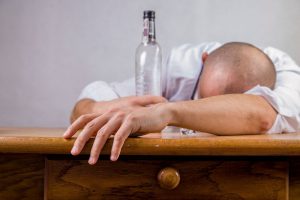13 May The Nightcap’s Toll: How alcohol hinders healthy sleep

Are you among the many who enjoy a nightcap before bed? While that glass of wine or bottle of beer might seem like a relaxing way to wind down, it could be taking a toll on your sleep, especially if you’re already prone to snoring or sleep apnea.
At our thoracic and sleep disorders unit, where we specialise in therapies like CPAP for sleep apnea and snoring issues, we’ve seen firsthand how alcohol can exacerbate these conditions. Let’s delve into the science behind how alcohol interferes with your sleep and exacerbates snoring and sleep apnea.
The Physiology of Sleep and Alcohol
When you indulge in alcohol before bedtime, it sets off a cascade of physiological changes that can disrupt your sleep. Alcohol acts as a sedative, affecting neurotransmitter systems crucial for regulating sleep. Initially, it might help you fall asleep faster, but as the night progresses, its effects wear off, leading to fragmented and poor-quality sleep.
Snoring and Sleep Apnea Amplified
For those who already snore or suffer from obstructive sleep apnea (OSA), alcohol can worsen symptoms. OSA occurs when tissues in the throat collapse, obstructing the airway during sleep. Alcohol exacerbates this by causing relaxation of tongue and throat muscles, increasing the likelihood and duration of breathing pauses during sleep. It also alters blood vessels in the nose, raising airway resistance and further impeding breathing.
Additionally, alcohol affects individuals with central sleep apnea (CSA), where the brain intermittently fails to send signals for breathing. By interfering with the brain’s reception of these signals, alcohol decreases respiratory drive, heightening the risk of breathing pauses.
The Night’s Unseen Consequences
Even if you don’t snore or have sleep apnea, alcohol can still disrupt your sleep architecture, leading to a restless night. Chronic alcohol abuse and dependence are associated with significant sleep disturbances, characterised by reduced slow-wave sleep and increased rapid eye movement (REM) sleep. These disruptions persist even during periods of abstinence and may contribute to relapse.
Choosing Better Sleep
If you’re struggling with sleep issues or are prone to snoring or sleep apnea, consider reducing or eliminating alcohol consumption before bedtime. Instead, opt for relaxation techniques like deep breathing, meditation, or gentle stretching to unwind. Research shows meditation aims to bring about overall relaxation that helps prepare the body for sleep.
For those with diagnosed sleep disorders like sleep apnea, adhering to prescribed therapies such as continuous positive airway pressure (CPAP) can greatly improve sleep quality and overall health. Our team is here to support you on your journey to better sleep.
In conclusion, while that nightcap might seem like a soothing ritual, it could be wreaking havoc on your sleep and exacerbating underlying conditions like snoring and sleep apnea. By understanding the impact of alcohol on sleep and making conscious choices to prioritize restful sleep, you can wake up feeling refreshed and ready to tackle the day ahead.
References:
Arnedt, J. (2024, April). Insomnia in patients with a substance use disorder. In R. Benca & A. Eichler (Ed.).
https://www.uptodate.com/contents/insomnia-in-patients-with-a-substance-use-disorder
Black, D. S., O’Reilly, G. A., Olmstead, R., Breen, E. C., & Irwin, M. R. (2015). Mindfulness meditation and improvement in sleep quality and daytime impairment among older adults with sleep disturbances: A randomized clinical trial. JAMA Internal Medicine, 175(4), 494–501. https://doi.org/10.1001/jamainternmed.2014.8081
Burgos-Sanchez, C., Jones, N. N., Avillion, M., Gibson, S. J., Patel, J. A., Neighbors, J., Zaghi, S., & Camacho, M. (2020). Impact of Alcohol Consumption on Snoring and Sleep Apnea: A Systematic Review and Meta-analysis. Otolaryngology–head and neck surgery: official journal of American Academy of Otolaryngology-Head and Neck Surgery, 163(6), 1078–1086.
https://pubmed.ncbi.nlm.nih.gov/32513091/
Colrain, I. M., Nicholas, C. L., & Baker, F. C. (2014). Alcohol and the Sleeping Brain. In J. A. Hobson & R. Stickgold (Eds.), Handbook of Clinical Neurology (Vol. 125, pp. 415–431). Elsevier. https://doi.org/10.1016/B978-0-444-62619-6.00024-0
https://www.ncbi.nlm.nih.gov/pmc/articles/PMC5821259/
Written by: Manisha Turner, Registered Nurse at TSGQ

